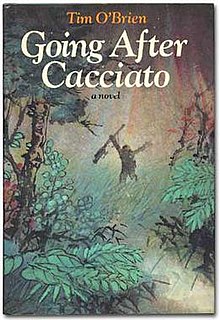
Platoon is a 1986 American war film written and directed by Oliver Stone, starring Tom Berenger, Willem Dafoe, Charlie Sheen, Keith David, Kevin Dillon, John C. McGinley, Forest Whitaker, and Johnny Depp. It is the first film of a trilogy of Vietnam War films directed by Stone, followed by Born on the Fourth of July (1989) and Heaven & Earth (1993). The film, based on Stone's experience from the war, follows a new U.S. Army volunteer (Sheen) serving in Vietnam while his Platoon Sergeant and his Squad Leader argue over the morality in the platoon and of the war itself.
"The Purple Testament" is the nineteenth episode of the American television anthology series The Twilight Zone. It is "the story of a man who can forecast death". It originally aired on February 12, 1960, on CBS.
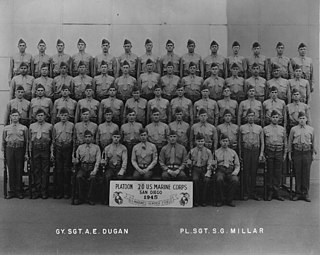
A platoon is a military unit typically composed of two to four squads, sections, or patrols. Platoon organization varies depending on the country and the branch, but a platoon can be composed of 20–50 troops, although specific platoons may range from 10 to 100 people. A platoon is typically the smallest military unit led by a commissioned officer. The platoon leader is usually a junior officer—a second or first lieutenant or an equivalent rank. The officer is usually assisted by a platoon sergeant.

Tim O'Brien is an American novelist who served as a soldier in the Vietnam War. Much of his writing is about wartime Vietnam, and his work later in life often explores the postwar lives of its veterans.
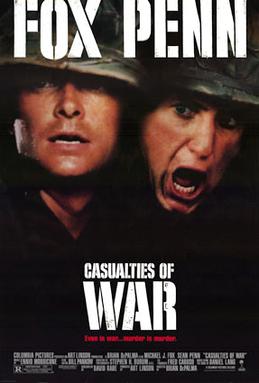
Casualties of War is a 1989 American war drama film directed by Brian De Palma and written by David Rabe, based primarily on an article written by Daniel Lang for The New Yorker in 1969, which was later published as a book. The film stars Michael J. Fox and Sean Penn and is based on the events of the 1966 incident on Hill 192 during the Vietnam War, in which a Vietnamese woman was kidnapped from her village by a squad of American soldiers, who raped and murdered her. For the film, all names and some details of the true story were altered.
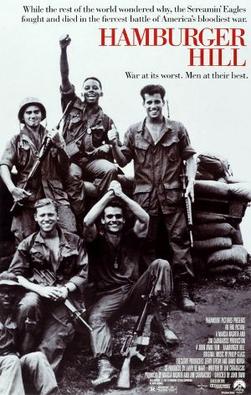
Hamburger Hill is a 1987 American war film set during the Battle of Hamburger Hill, a May 1969 assault during the Vietnam War by the U.S. Army's 3rd Battalion, 187th Infantry, 101st Airborne Division, on a ridge of Dong Ap Bia near the Laotian border in central Vietnam. The ridge was a well-fortified position, including trenchworks and bunkers, of the North Vietnamese Army. U.S. military records of the battle refer to the mountain as "Hill 937," its map designation having been derived from the high elevation of the hill at 937 meters (3,074 ft).

The Things They Carried (1990) is a collection of linked short stories by American novelist Tim O'Brien, about a platoon of American soldiers fighting on the ground in the Vietnam War. His third book about the war, it is based upon his experiences as a soldier in the 23rd Infantry Division.

James Henry Webb Jr. is an American politician and author. He has served as a United States senator from Virginia, Secretary of the Navy, Assistant Secretary of Defense for Reserve Affairs, Counsel for the United States House Committee on Veterans' Affairs and is a Marine Corps officer.

Tigerland is a 2000 American war drama film directed by Joel Schumacher and starring Colin Farrell. It takes place in a training camp for soldiers to be sent to the Vietnam War.
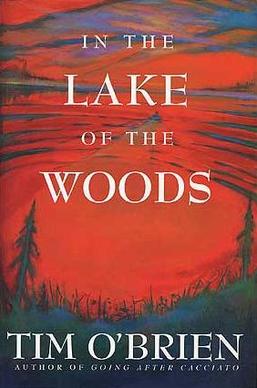
In the Lake of the Woods (1994) is a novel by the American author Tim O'Brien. In the Lake of the Woods follows the struggle of Vietnam veteran John Wade trying to deal with a recently failed campaign for the United States Senate. After moving to Lake of the Woods County, Minnesota, John discovers one morning that his wife, Kathy, is missing. Through flashbacks to John's childhood, college years, and war experiences, as well as testimony and evidence from affected characters, the novel provides several hypotheses for Kathy's disappearance, without resolving the question.
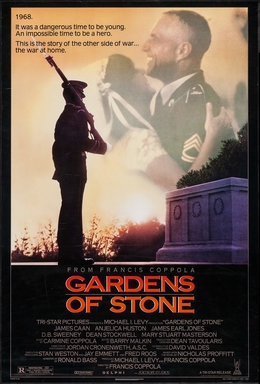
Gardens of Stone is a 1987 American drama film directed by Francis Ford Coppola, based on a novel of the same name by Nicholas Proffitt. It stars James Caan, Anjelica Huston, James Earl Jones, D. B. Sweeney, Dean Stockwell and Mary Stuart Masterson.
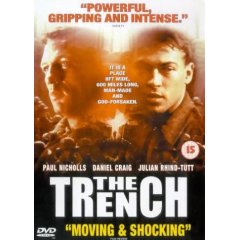
The Trench is a 1999 war film written and directed by William Boyd and starring Paul Nicholls and Daniel Craig. It depicts the experiences of a group of young British soldiers in the 48 hours leading up to the Battle of the Somme in 1916.

Alfred Velazquez Rascon is a retired United States Army lieutenant colonel. In 2000, he was awarded the Medal of Honor—the United States' highest military decoration—for his actions as a medic near Long Khánh Province during the Vietnam War.
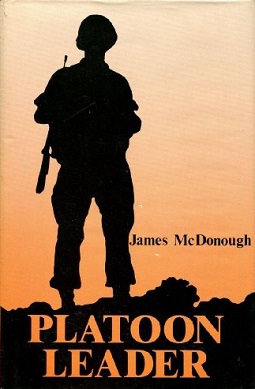
Platoon Leader is a memoir by James R. McDonough. It is narrated by McDonough in first person view and tells of his story in the Vietnam War as a lieutenant in command of 2nd Platoon, Bravo Company, 4th Battalion, 503rd Infantry(Airborne). It was loosely adapted into the 1988 film Platoon Leader.

Fields of Fire is a novel by U.S. Senator Jim Webb, first published in 1978. It is a work of fiction which depicts a platoon of Marines serving in the Vietnam War.
The 317th Platoon is a 1965 French black-and-white war film set during the First Indochina War (1946–54) written and directed by Pierre Schoendoerffer. The film was based on Schoendoerffer's 1963 novel of the same name.
"Where Have You Gone, Charming Billy?" is a short story by Tim O'Brien that was written in May 1975.
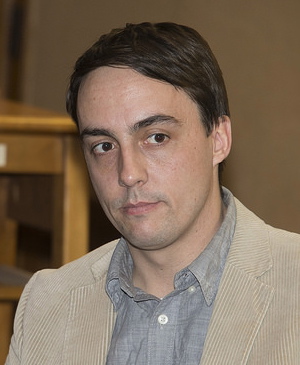
Matt Gallagher is an American author, veteran of the Iraq War and war correspondent. Gallagher has written on a variety of subjects, mainly contemporary war fiction and non-fiction. He first became known for his war memoir Kaboom (2010), which tells of his and his scout platoon's experiences during the Iraq War.
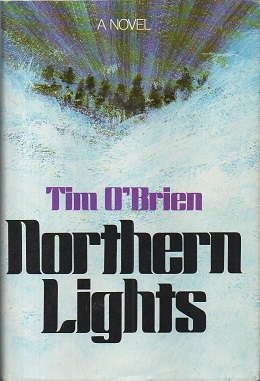
Northern Lights is the debut novel of Tim O'Brien. The novel, originally published in August of 1975, focuses on the relationship of two brothers. Much of the plot is set during a cross-country ski trip.
